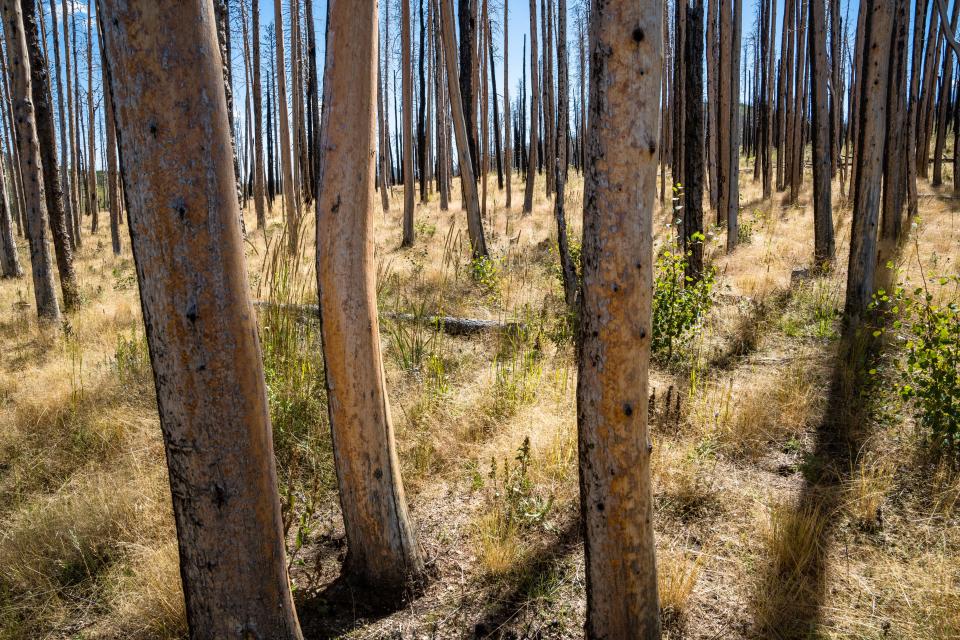This federal bill seeks to protect water quality after wildfires like Cameron Peak
- Oops!Something went wrong.Please try again later.
Three Colorado lawmakers are introducing federal legislation intended to better protect watersheds and water quality after wildfires strike, citing problems that occurred after the 2020 Cameron Peak and East Troublesome fires.
Sen. Michael Bennet and Reps. Joe Neguse and Yadira Caraveo, all Democrats, are among several Colorado and Utah lawmakers behind the bipartisan proposal, which would create a program and funding source to protect the watershed when natural disasters happen on U.S. Forest Service land.
The Watershed Protection and Forest Recovery Act seeks to fill a current gap that makes it difficult for water providers to protect their drinking water supply, a news release from Bennet's office said.
After the Cameron Peak and East Troublesome fires, those water providers "encountered major obstacles" using the existing Emergency Watershed Program because it was designed for recovery on nonfederal lands. Another program, the Burned Area Emergency Response Program, does cover federal lands but is focused on protecting federal assets, not drinking water, the news release said.
Open wounds: Colorado wildfire experts worried by lack of new vegetation in burn areas
Fort Collins' water supply comes from the Poudre River and the Big Thompson-Colorado Water Project.
"The 2020 Cameron Peak Fire burned over 208,000 acres across the Arapaho-Roosevelt National Forest and spanned three watersheds," said Hally Strevey, executive director of Coalition for the Poudre River Watershed, in a news release. "Securing funding for the immediate recovery needs was challenging because the majority of the burn was on federal land, and the existing Emergency Watershed Protection Program is limited to use on private lands."
"After a severe wildfire, post-fire changes to hydrology and sediment delivery put many watershed values at risk — thus it is important to implement projects quickly and efficiently 1-2 years post-fire," Strevey said.

Under the bill, a new Emergency Forest Watershed Program would be developed at the U.S. Department of Agriculture to streamline recovery efforts and protect life, private property and water resources downstream of America’s national forests.
The lawmakers say the bill would:
Create a dedicated funding source.
Authorize watershed recovery protection measures following a natural disaster that has caused a sudden impairment to natural resources on National Forest System land.
Allow tribes, states, local governments, water utilities, water districts, water conservation districts and special districts to enter into agreements with USFS to implement watershed recovery protection measures.
Speed up project timelines by minimizing environmental reviews and requiring project sponsors to complete recovery work within two years after the conclusion of a natural disaster.
Provide liability protection to the project sponsors.
Fully fund projects on federal lands, waiving matching requirements of the project sponsors.
The bill is also sponsored by U.S. Sen. Mitt Romney (R-Utah), Rep. Celeste Maloy (R-Utah) and Rep. John Curtis (R-Utah).
“We need to make it easier for local water managers and the U.S. Forest Service to collaborate to restore the health of our watersheds following a natural disaster,” Bennet said. “This common-sense bill cuts red tape and helps ensure that communities and landscapes recovering from wildfires don’t face unnecessary hurdles in their efforts to protect their drinking water.”
“Across the West, our communities continue to grapple with devastating wildfires,” Neguse said.“These wildfires put watersheds and the drinking water supplies for many of our communities at risk. Our bill, the Watershed Protection and Forest Recovery Act, aims to ensure that critical federal resources are available to assist communities address these watershed risks in the aftermath of catastrophic wildfires.”
“Protecting our watersheds is a commitment to safeguarding the very existence of our communities in Colorado. Unfortunately, wildfires, rainfall and changing climate are threatening the stability of the water in our state,” Caraveo said.“I am glad to co-lead the Watershed Protection and Forest Recovery Act to help in the restoration and protection of the natural resources that provide drinking water for communities like the city of Greeley, and surrounding communities in Northern Colorado I am proud to represent.”
“The city of Fort Collins is grateful for and supportive of this needed solution to fix gaps and unnecessary delays in post-fire treatment on Forest Service land that directly impacts the health of our region’s watershed,” said City Manager Kelly DiMartino.
Northern Colorado Water Conservancy District General Manager Brad Wind said:“The ongoing damage to watersheds and the threat to drinking water for millions highlight the critical nature of this initiative. ... This new authority is vital for future wildfire recovery, stressing collaborative efforts across governments and partners to protect our communities and resources.”
This article originally appeared on Fort Collins Coloradoan: Proposed federal bill seeks to protect drinking water after wildfires

